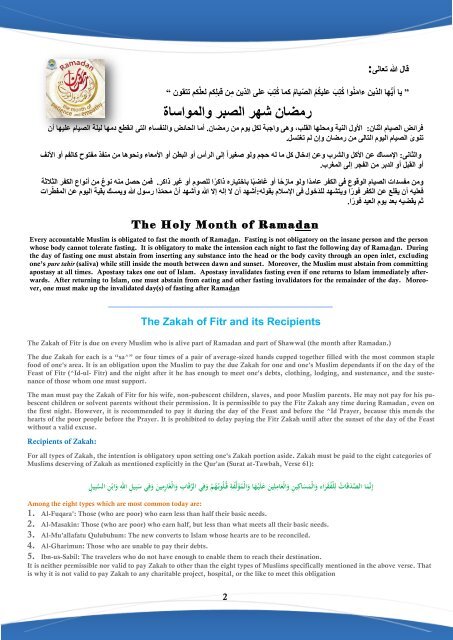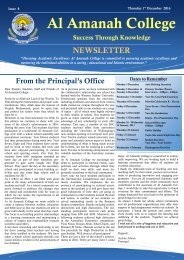Al Amanah College
2gYzYHla1
2gYzYHla1
Create successful ePaper yourself
Turn your PDF publications into a flip-book with our unique Google optimized e-Paper software.
Newsletter 2013<br />
<strong>Al</strong> <strong>Amanah</strong> <strong>College</strong><br />
قال هللا تعالى :<br />
” يا أَيُّها الذين ءامَنُوا كُتِبَ عليكُمُ الصّيامُ كما كُتِبَ على الذين مِن قبلِكم لعلَّكم تتقون “<br />
رمضان شهر الصبر والمواساة<br />
فرائض الصيام اثنان: األول النية ومحلها القلب، وهى واجبة لكل يوم من رمضان. أما الحائض والنفساء التى انقطع دمها ليلة الصيام عليها أن<br />
تنوىَ الصيام اليوم التالى من رمضان وإن لم تغتسل.<br />
والثانى: اإلمساك عن األكل والشرب وعن إدخال كل ما له حجم ولو صغيراً إلى الرأس أو البطن أو األمعاء ونحوها من منفذ مفتوح كالفم أو األنف<br />
أو القبل أو الدبر من الفجر إلى المغرب.<br />
ومن مفسدات الصيام الوقوع فى الكفر عامدًا ولو مازحًا أو غاضبًا باختياره ذاكرًا للصوم أو غير ذاكر. فمن حصل منه نوعٌ من أنواع الكفر الثالثة<br />
فعليه أن يقلع عن الكفر فورًا ويتشهد للدَخول فى اإلسالم بقوله:أشهد أن ال إله إال هللا وأشهد أنّ محمّدًا رسول هللا ويمسك بقية اليوم عن المفطّرات<br />
ثم يقضيه بعد يوم العيد فورًا.<br />
T he Holy Month of Rama dan<br />
Every accountable Muslim is obligated to fast the month of Ramadan. Fasting is not obligatory on the insane person and the person<br />
whose body cannot tolerate fasting. It is obligatory to make the intension each night to fast the following day of Ramadan. During<br />
the day of fasting one must abstain from inserting any substance into the head or the body cavity through an open inlet, excluding<br />
one’s pure tahir (saliva) while still inside the mouth between dawn and sunset. Moreover, the Muslim must abstain from committing<br />
apostasy at all times. Apostasy takes one out of Islam. Apostasy invalidates fasting even if one returns to Islam immediately afterwards.<br />
After returning to Islam, one must abstain from eating and other fasting invalidators for the remainder of the day. Moreover,<br />
one must make up the invalidated day(s) of fasting after Ramadan<br />
The Zakah of Fitr and its Recipients<br />
The Zakah of Fitr is due on every Muslim who is alive part of Ramadan and part of Shawwal (the month after Ramadan.)<br />
The due Zakah for each is a “sa^” or four times of a pair of average-sized hands cupped together filled with the most common staple<br />
food of one's area. It is an obligation upon the Muslim to pay the due Zakah for one and one's Muslim dependants if on the day of the<br />
Feast of Fitr (^Id-ul- Fitr) and the night after it he has enough to meet one's debts, clothing, lodging, and sustenance, and the sustenance<br />
of those whom one must support.<br />
The man must pay the Zakah of Fitr for his wife, non-pubescent children, slaves, and poor Muslim parents. He may not pay for his pubescent<br />
children or solvent parents without their permission. It is permissible to pay the Fitr Zakah any time during Ramadan, even on<br />
the first night. However, it is recommended to pay it during the day of the Feast and before the ^Id Prayer, because this mends the<br />
hearts of the poor people before the Prayer. It is prohibited to delay paying the Fitr Zakah until after the sunset of the day of the Feast<br />
without a valid excuse.<br />
Recipients of Zakah:<br />
For all types of Zakah, the intention is obligatory upon setting one's Zakah portion aside. Zakah must be paid to the eight categories of<br />
Muslims deserving of Zakah as mentioned explicitly in the Qur'an (Surat at-Tawbah, Verse 61):<br />
إِنَّمَا الصَّدَقَاتُ لِلْفُقَرَاء وَالْمَسَاكِينِ وَالْعَامِلِينَ عَلَيْهَا وَالْمُؤَلَّفَةِ قُلُوب ُهُمْ وَفِي الرِّقَابِ وَالْ غَارِمِينَ وَفِي سَبِيلِ اهللِ وَابْنِ السَّبِيِل<br />
Among the eight types which are most common today are:<br />
1. <strong>Al</strong>-Fuqara': Those (who are poor) who earn less than half their basic needs.<br />
2. <strong>Al</strong>-Masakin: Those (who are poor) who earn half, but less than what meets all their basic needs.<br />
3. <strong>Al</strong>-Mu'allafatu Qulubuhum: The new converts to Islam whose hearts are to be reconciled.<br />
4. <strong>Al</strong>-Gharimun: Those who are unable to pay their debts.<br />
5. Ibn-us-Sabil: The travelers who do not have enough to enable them to reach their destination.<br />
It is neither permissible nor valid to pay Zakah to other than the eight types of Muslims specifically mentioned in the above verse. That<br />
is why it is not valid to pay Zakah to any charitable project, hospital, or the like to meet this obligation<br />
2








